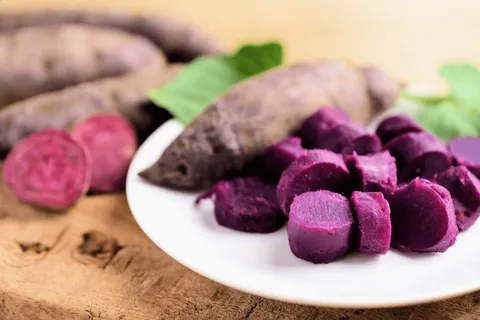Potatoes are a staple food in many cultures, valued for their versatility, affordability, and satisfying taste. While most people are familiar with white and yellow potatoes, purple potatoes stand out with their vibrant hue and unique nutritional profile. Beyond their striking appearance, purple potatoes offer a host of surprising health benefits that make them a valuable addition to any diet. In this comprehensive guide, we’ll delve into seven unexpected benefits of purple potatoes, exploring their nutritional value, culinary versatility, and potential impact on health.
Rich in Antioxidants
Purple potatoes owe their distinctive color to the presence of anthocyanins, potent antioxidants found in various fruits and vegetables. These antioxidants help protect the body from oxidative stress and inflammation, reducing the risk of chronic diseases such as heart disease, cancer, and diabetes. By incorporating purple potatoes into your diet, you can boost your antioxidant intake and support overall health and well-being.
Supports Heart Health
Consuming purple potatoes may have beneficial effects on heart health, thanks to their high potassium content. Potassium is an essential mineral that helps regulate blood pressure, maintain fluid balance, and support proper muscle function. By promoting healthy blood pressure levels, purple potatoes can reduce the risk of hypertension and cardiovascular disease, making them a heart-healthy choice for your meals.
Enhances Digestive Health
Purple potatoes are an excellent source of dietary fiber, with both soluble and insoluble fiber varieties. Fiber plays a crucial role in digestive health, promoting regularity, preventing constipation, and supporting a healthy gut microbiome. By including purple potatoes in your diet, you can improve digestive function, optimize nutrient absorption, and support overall gastrointestinal health.
Boosts Immune Function
The vibrant purple color of these potatoes isn’t just visually appealing—it’s also a sign of their high antioxidant content, which includes vitamins C and E. These antioxidants play a key role in supporting immune function, helping the body defend against infections and illnesses. By incorporating purple potatoes into your meals, you can strengthen your immune system and enhance your body’s ability to fight off pathogens.
May Aid Weight Management
Despite their starchy nature, purple potatoes can be a valuable addition to a weight management plan, thanks to their high fiber content and low glycemic index (GI). Foods with a low GI are digested more slowly, leading to gradual increases in blood sugar levels and prolonged feelings of fullness. By promoting satiety and stabilizing blood sugar levels, purple potatoes can help curb cravings and support weight loss or maintenance efforts.
Supports Brain Health
The antioxidants found in purple potatoes have been linked to improved cognitive function and brain health. Anthocyanins, in particular, have been shown to have neuroprotective effects, helping to reduce inflammation, oxidative stress, and age-related cognitive decline. By including purple potatoes in your diet, you can nourish your brain and support cognitive function throughout life.
Versatile Culinary Ingredient
In addition to their impressive nutritional profile, purple potatoes are incredibly versatile in the kitchen. They can be boiled, baked, roasted, mashed, or fried, offering endless possibilities for creative culinary exploration. From colorful salads and vibrant side dishes to hearty soups and comforting casseroles, purple potatoes add both flavor and visual appeal to a wide range of dishes.
FAQs About Purple Potatoes
Are purple potatoes genetically modified?
No, purple potatoes are not genetically modified. They naturally contain anthocyanins, the pigments responsible for their vibrant purple color.
Do purple potatoes taste different from regular potatoes?
Purple potatoes have a slightly nutty flavor and a denser texture compared to white potatoes. Some people also describe them as earthy or slightly sweet.
Can you eat the skin of purple potatoes?
Yes, the skin of purple potatoes is edible and contains valuable nutrients, including fiber and antioxidants. However, be sure to wash them thoroughly before cooking to remove any dirt or debris.
Where can I find purple potatoes?
Purple potatoes are becoming increasingly popular and can often be found in well-stocked grocery stores, specialty food markets, or farmers’ markets, especially during their peak season.
How should I store purple potatoes?
Store purple potatoes in a cool, dark, and well-ventilated place, such as a pantry or cellar. Avoid storing them in the refrigerator, as the cold temperatures can cause the starches to convert to sugar and affect their flavor and texture.
Can I substitute purple potatoes for other potatoes in recipes?
Yes, purple potatoes can typically be used interchangeably with other potatoes in most recipes. However, keep in mind that their vibrant color may affect the appearance of the final dish.
Are there any potential side effects of eating purple potatoes?
Purple potatoes are generally safe to eat for most people when consumed as part of a balanced diet. However, some individuals may be allergic to potatoes or experience digestive discomfort if consumed in large quantities.
Conclusion
Purple potatoes are more than just a colorful addition to your plate—they’re nutritional powerhouses packed with antioxidants, fiber, vitamins, and minerals. From supporting heart health and digestive function to boosting immune function and brain health, these vibrant tubers offer a multitude of surprising health benefits. Whether roasted, mashed, or incorporated into your favorite recipes, purple potatoes can add both flavor and nutrition to your meals. So why not give them a try and experience the wonders of purple potatoes for yourself?
- The Ultimate Review Top Delta 8 Gummies Unveiled By Golden Goat CBD - April 23, 2024
- Sweet Serenity: Navigating the World of Just Delta CBD Gummies - April 23, 2024
- Whole Grain vs. Whole Wheat Whats the Difference? - April 13, 2024
